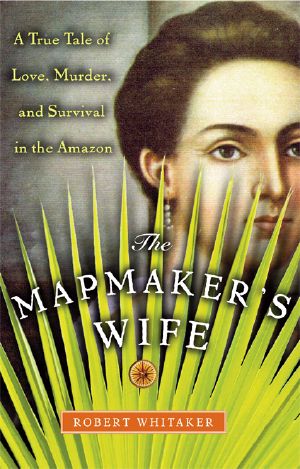The Mapmaker's Wife · A True Tale of Love, Murder, and Survival in the Amazon

- Authors
- Whitaker, Robert
- Publisher
- Delta
- Tags
- south america , world , 18th century , history , non-fiction
- ISBN
- 9780786741847
- Date
- 2004-04-12T23:00:00+00:00
- Size
- 7.18 MB
- Lang
- en
In the early years of the 18th century, a band of French scientists set off on a daring, decade-long expedition to South America in a race to measure the precise shape of the earth. Like Lewis and Clark's exploration of the American West, their incredible mission revealed the mysteries of a little-known continent to a world hungry for discovery. Scaling 16,000foot mountains in the Peruvian Andes, and braving jaguars, pumas, insects, and vampire bats in the jungle, the scientists barely completed their mission. One was murdered, another perished from fever, and a third-Jean Godin-nearly died of heartbreak. At the expedition's end, Jean and his Peruvian wife, Isabel Gramesón, became stranded at opposite ends of the Amazon, victims of a tangled web of international politics. Isabel's solo journey to reunite with Jean after their calamitous twenty-year separation was so dramatic that it left all of 18th-century Europe spellbound. Her survival-unprecedented in the annals of Amazon exploration-was a testament to human endurance, female resourcefulness, and the power of devotion.Drawing on the original writings of the French mapmakers, as well as his own experience retracing Isabel's journey, acclaimed writer Robert Whitaker weaves a riveting tale rich in adventure, intrigue, and scientific achievement. Never before told, The Mapmaker's Wife is an epic love story that unfolds against the backdrop of "the greatest expedition the world has ever known."
From Publishers WeeklyAs was customary for girls from elite families in 18th-century colonial Peru, Isabel Gramesón was barely a teenager when she married Jean Godin, a Frenchman visiting the territory as an assistant on a scientific expedition. Planning to bring his wife back to France, Godin trekked across South America to check in with the French colonial authorities, but was refused permission to return up the Amazon back into Spanish territory to retrieve Isabel. So they remained a continent apart for 20 years until 1769, when Isabel started making her way east. Her party ran aground on the Bobonaza River (which feeds into the Amazon), and though almost everyone perished, she managed to survive alone in the rainforest for weeks. Although science journalist Whitaker doesn't directly refer to his own modern trek following Isabel's route down the Bobonaza, his descriptions of the conditions she would have encountered convey his familiarity with the territory, often quite viscerally, ("There are giant stinging ants, ants that bite, and ants that both bite and sting"). His account of the French expedition that brought Godin to Peru and then separated him from his new wife is equally vivid, with exhilarating discoveries and petty squabbles-and richly illustrated with contemporary drawings. Though an early, long digression tracing the history of attempts to measure the size of the earth may establish the context a little too solidly, making some readers impatient, they'll certainly be hooked once the story really begins. Isabel and Jean's adventures are riveting enough on their own, and colonial South America's largely unfamiliar history adds another compelling layer to this well-crafted yarn. Copyright © Reed Business Information, a division of Reed Elsevier Inc. All rights reserved.
From School Library JournalAdult/High School–Whitaker merges a gripping account of scientific exploration with an amazing story of survival in the wilderness. For those who think of the Enlightenment only in terms of sedate Paris salons, this book will alter that image forever. The best minds of Europe in the 1730s knew that the Earth was not perfectly round, but the exact size and shape were in hot debate. Someone figured out that to nail down the answer certain data was needed, and that the best place to get that data was at the equator. Given the technological and political realities of the time, that meant one place: Peru. A scientific expedition was organized in Paris and sent to the New World in 1735. After 10 years of incredible hardships and setbacks, it accomplished its mission (and a host of other enlightenments along the way). As captivating as this story proved to be, another developed: a young member of the party met, fell in love with, and married an upper-class, 13-year-old Peruvian girl. Due to a tangled swirl of unfortunate events, this couple became separated for 20 years (beginning just before the birth of their only child). Finally, in 1769, Isabel Gramesón set off on a trek through the most inhospitable of jungles to rejoin her husband in French Guiana. The author's depiction of that harrowing journey is the crowning jewel of this outstanding volume.–Robert Saunderson, Berkeley Public Library, CA Copyright © Reed Business Information, a division of Reed Elsevier Inc. All rights reserved.